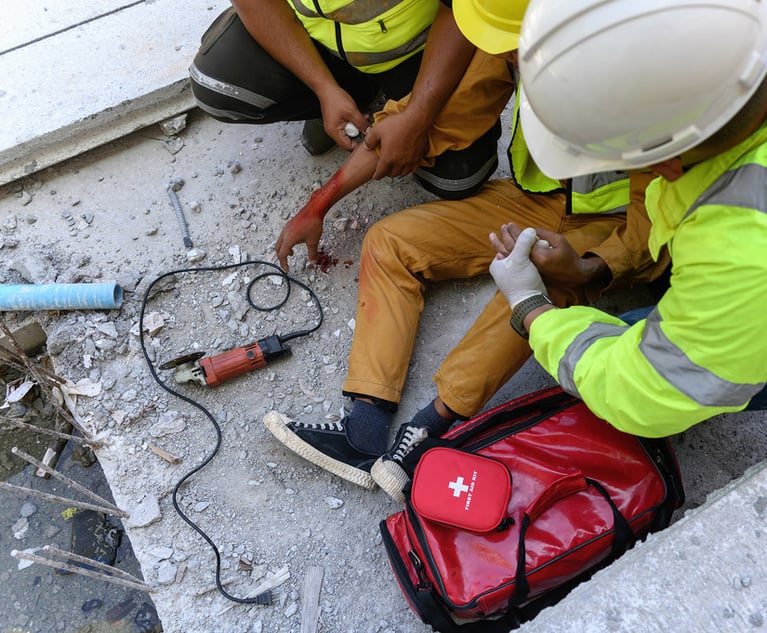Hovnanian's Indemnity Action Against Architect Fails in $10M Hudson County Condo Case
The developer of a Hudson County property that fell short of local fire code has failed in its effort to have the project's architect indemnify it following a multimillion-dollar jury verdict awarded to unit owners two years ago.
August 14, 2019 at 02:13 PM
5 minute read
 FabrikaSimf/Shutterstock.com
FabrikaSimf/Shutterstock.com
The developer of a Hudson County property that fell short of local fire code has failed in its effort to have the project’s architect indemnify it following a multimillion-dollar jury verdict awarded to unit owners two years ago.
The Appellate Division on Tuesday affirmed denial of a post-trial motion seeking indemnification lodged by K. Hovnanian at Port Imperial Urban Renewal II against RTKL New Jersey Architects P.A., its co-defendant in the suit over the development: Grandview at Riverwalk at Port Imperial in West New York.
A Hudson County jury in June 2017 awarded the plaintiff-condo owners $3 million in damages against the Hovnanian entity, a subsidiary of national developer Hovnanian Enterprises. That sum was trebled to $9 million under the state Consumer Fraud Act. The jury also awarded the plaintiffs $1 million against RTKL.
According to the decision, Hovnanian in 2003 bought the then-undeveloped property in West New York, and contracted with RTKL to design the building. RTKL had worked with a previous developer on the project.
The building was approved by the town as a “type 2B” structure, meaning fire-retardant, pressure-treated wood would be used. But the structure ended up including regular plywood—and it was April 2005, with the building more than half complete, by the time the developer and architect met to discuss the issue, the decision said, noting that when Hovnanian actually learned of the issue was in dispute in the case.
The proposed solution was to reclassify the six-story building as “type 3A” by adding some fire-retardant features, with the town’s approval. Hovnanian said, in an internal email quoted by the court: “‘This may be another situation where we may need to use some political capital to expedite approvals of the changes.’”
Hovnanian then sent a letter drafted by RTKL outlining the issues to the town, but, the court said, “There is nothing in the record to show that Hovnanian took any steps to obtain approval of the classification change beyond hand-delivering the plans, nor anything to show that West New York ever approved it.”
The plaintiffs would claim in the suit that the building didn’t meet even the type 3A standards because it lacked a solid masonry exterior. The unit owners said they bought the units without the town ever approving the plan changes, and suffered monetary losses because of it.
At trial, Hovnanian contended that it quickly provided a solution to the code-compliance problem the same day it learned of it, and wasn’t aware that RTKL’s plan, even as revised, would still cause the building to fall short of fire code.
Following a trial before Hudson County Superior Court Judge Jeffrey Jablonski, the jury in June 2017 found RTKL negligently designed the building, and that Hovnanian breached its warranty by failing to ensure that the building was built in keeping with its intended purpose. The jury also found that Hovnanian violated the CFA by omitting information about the problematic building materials when selling the units.
The plaintiffs, members of the Grandview at Riverwalk Port Imperial Condominium Association, were awarded a total of $10 million.
After trial, Jablonski awarded the plaintiffs $1.79 million in attorney fees and costs per the CFA’s fee-shifting provision, according to electronic court records.
Jablonski first denied Hovnanian’s motion for indemnification before trial, pending the jury’s determinations on RTKL’s negligence, and he denied Hovanian’s renewed motion for indemnification after trial.
The judge found that the contract between the developer and the architect required RTKL to indemnify Hovnanian for its own negligent acts, not for negligent acts committed by Hovnanian. Jablonski “acknowledged ‘that without the negligence of [Architects], the issues of the breach of warranty’ would never have arisen,” the appeals court said, but he noted that Hovnanian essentially was found liable for how it conducted itself after the building materials issue was brought to its attention.
Hovnanian appealed. On Tuesday, Appellate Division Judges Allison Accurso, Francis Vernoia and Scott Moynihan affirmed in a per curiam decision, with “no hesitation in concluding the trial court was correct that [RTKL] does not owe Hovnanian indemnification under their agreement.”
RTKL in the contract agreed to indemnify for negligent acts and omissions “‘on the part of the architect,’” the panel said.
Jablonski “properly rejected, as do we, Hovnanian’s claim that the evidence established its liability was merely passive,” the panel said, noting “evidence in the record to permit the jury to conclude that Hovnanian was aware of the problem with the untreated plywood as early as May 2004.”
Though Hovnanian “is undoubtedly correct that its own breach of warranty would not have occurred but for [RTKL's] negligence, the jury’s verdict established conclusively that [RTKL's] negligence was not the sole cause of Hovnanian’s breach,” the panel said.
Hovnanian’s counsel, Donald Taylor of Wilentz, Goldman & Spitzer in Woodbridge, didn’t return a call seeking comment.
Neither did RTKL’s counsel, Gary Chiumento of Chiumento McNally in Voorhees.
This content has been archived. It is available through our partners, LexisNexis® and Bloomberg Law.
To view this content, please continue to their sites.
Not a Lexis Subscriber?
Subscribe Now
Not a Bloomberg Law Subscriber?
Subscribe Now
NOT FOR REPRINT
© 2025 ALM Global, LLC, All Rights Reserved. Request academic re-use from www.copyright.com. All other uses, submit a request to [email protected]. For more information visit Asset & Logo Licensing.
You Might Like
View All

Dispute Resolution Boards—Getting Real Time Decisions on Construction Projects
7 minute read
Insurer Has No Duty to Defend 'Laidlow' Claims, NJ Supreme Court Says
3 minute read
Construction Worker Hit by Falling Concrete Settles Claims for $2.3M
4 minute readTrending Stories
- 1'A Death Sentence for TikTok'?: Litigators and Experts Weigh Impact of Potential Ban on Creators and Data Privacy
- 2Bribery Case Against Former Lt. Gov. Brian Benjamin Is Dropped
- 3‘Extremely Disturbing’: AI Firms Face Class Action by ‘Taskers’ Exposed to Traumatic Content
- 4State Appeals Court Revives BraunHagey Lawsuit Alleging $4.2M Unlawful Wire to China
- 5Invoking Trump, AG Bonta Reminds Lawyers of Duties to Noncitizens in Plea Dealing
Who Got The Work
J. Brugh Lower of Gibbons has entered an appearance for industrial equipment supplier Devco Corporation in a pending trademark infringement lawsuit. The suit, accusing the defendant of selling knock-off Graco products, was filed Dec. 18 in New Jersey District Court by Rivkin Radler on behalf of Graco Inc. and Graco Minnesota. The case, assigned to U.S. District Judge Zahid N. Quraishi, is 3:24-cv-11294, Graco Inc. et al v. Devco Corporation.
Who Got The Work
Rebecca Maller-Stein and Kent A. Yalowitz of Arnold & Porter Kaye Scholer have entered their appearances for Hanaco Venture Capital and its executives, Lior Prosor and David Frankel, in a pending securities lawsuit. The action, filed on Dec. 24 in New York Southern District Court by Zell, Aron & Co. on behalf of Goldeneye Advisors, accuses the defendants of negligently and fraudulently managing the plaintiff's $1 million investment. The case, assigned to U.S. District Judge Vernon S. Broderick, is 1:24-cv-09918, Goldeneye Advisors, LLC v. Hanaco Venture Capital, Ltd. et al.
Who Got The Work
Attorneys from A&O Shearman has stepped in as defense counsel for Toronto-Dominion Bank and other defendants in a pending securities class action. The suit, filed Dec. 11 in New York Southern District Court by Bleichmar Fonti & Auld, accuses the defendants of concealing the bank's 'pervasive' deficiencies in regards to its compliance with the Bank Secrecy Act and the quality of its anti-money laundering controls. The case, assigned to U.S. District Judge Arun Subramanian, is 1:24-cv-09445, Gonzalez v. The Toronto-Dominion Bank et al.
Who Got The Work
Crown Castle International, a Pennsylvania company providing shared communications infrastructure, has turned to Luke D. Wolf of Gordon Rees Scully Mansukhani to fend off a pending breach-of-contract lawsuit. The court action, filed Nov. 25 in Michigan Eastern District Court by Hooper Hathaway PC on behalf of The Town Residences LLC, accuses Crown Castle of failing to transfer approximately $30,000 in utility payments from T-Mobile in breach of a roof-top lease and assignment agreement. The case, assigned to U.S. District Judge Susan K. Declercq, is 2:24-cv-13131, The Town Residences LLC v. T-Mobile US, Inc. et al.
Who Got The Work
Wilfred P. Coronato and Daniel M. Schwartz of McCarter & English have stepped in as defense counsel to Electrolux Home Products Inc. in a pending product liability lawsuit. The court action, filed Nov. 26 in New York Eastern District Court by Poulos Lopiccolo PC and Nagel Rice LLP on behalf of David Stern, alleges that the defendant's refrigerators’ drawers and shelving repeatedly break and fall apart within months after purchase. The case, assigned to U.S. District Judge Joan M. Azrack, is 2:24-cv-08204, Stern v. Electrolux Home Products, Inc.
Featured Firms
Law Offices of Gary Martin Hays & Associates, P.C.
(470) 294-1674
Law Offices of Mark E. Salomone
(857) 444-6468
Smith & Hassler
(713) 739-1250






